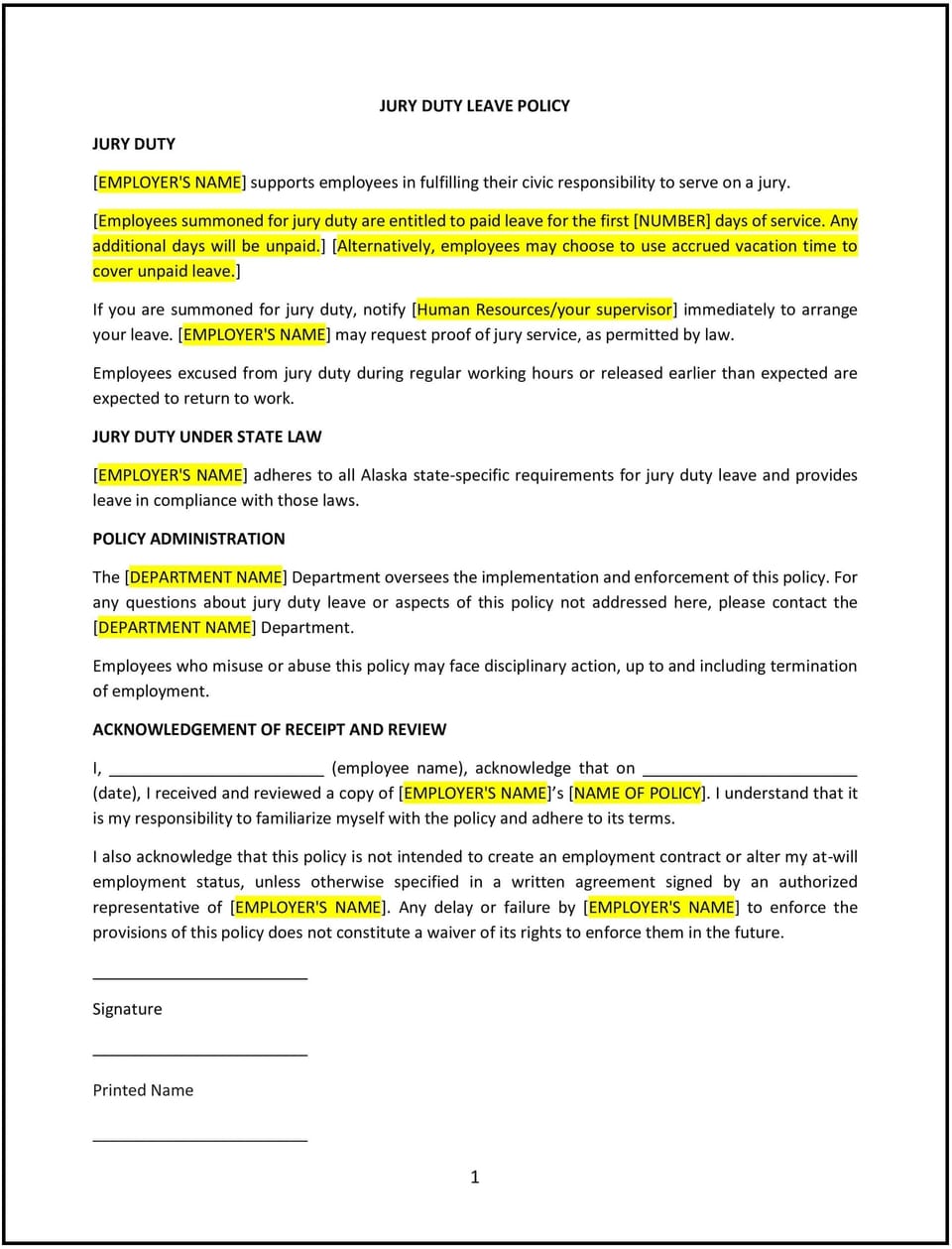Jury duty leave policy (Alaska): Free template

Jury duty leave policy (Alaska)
In Alaska, a jury duty leave policy ensures that employees can fulfill their civic responsibilities without fear of job loss or retaliation. This policy outlines the company’s approach to providing leave for employees summoned for jury duty, including eligibility, documentation requirements, and pay considerations. By implementing a clear jury duty leave policy, businesses can support employees’ legal obligations while maintaining operational efficiency.
Given Alaska’s unique workforce challenges, such as seasonal work and remote locations, businesses may need to include specific provisions to address these logistical factors.
How to use this jury duty leave policy (Alaska)
- Define eligibility: Specify which employees are eligible for jury duty leave, including full-time, part-time, and temporary workers, in accordance with Alaska state laws.
- Outline documentation requirements: Require employees to provide official jury summons notices and any subsequent documentation, such as proof of service, to validate leave.
- Address pay provisions: Clarify whether jury duty leave is paid, unpaid, or partially compensated, and provide guidance on how pay interacts with jury duty stipends provided by the court.
- Set notice expectations: Instruct employees to notify their manager or HR as soon as they receive a jury summons to allow for operational planning.
- Include return-to-work guidelines: Ensure employees understand the process for resuming work after their jury service concludes, including updating their manager on their availability.
Benefits of using a jury duty leave policy (Alaska)
A jury duty leave policy provides several benefits for businesses in Alaska. Here’s how it helps:
- Ensures compliance: Helps businesses adhere to Alaska laws prohibiting discrimination or retaliation against employees serving on a jury.
- Supports employee morale: Demonstrates respect for employees’ civic duties and legal obligations, fostering loyalty and trust.
- Minimizes disruptions: Provides a clear framework for managing employee absences due to jury duty, ensuring continuity in operations.
- Promotes transparency: Sets clear expectations for both employees and managers, reducing misunderstandings or conflicts.
- Protects the business: Reduces the risk of legal disputes related to jury duty leave, ensuring compliance with state and federal laws.
Tips for using a jury duty leave policy (Alaska)
- Tailor for remote work: Address logistical challenges for remote employees summoned for jury duty, such as additional travel time or expenses.
- Plan for absences: Develop contingency plans to manage workload redistribution during employee absences.
- Communicate policy clearly: Ensure employees are informed of their rights and responsibilities under the policy during onboarding and through employee handbooks.
- Monitor legal updates: Stay informed about changes in Alaska or federal jury duty laws to ensure continued compliance.
- Support flexibility: Encourage managers to accommodate employees returning from jury duty with adjusted workloads or schedules if needed.
Q: How should I manage workflow when an employee is on jury duty leave?
A: Plan ahead by redistributing tasks among team members, cross-training employees, or hiring temporary support to minimize disruptions.
Q: Are businesses required to pay employees during jury duty leave in Alaska?
A: Alaska does not require employers to provide paid jury duty leave, but businesses can choose to offer paid leave as a benefit to support employees.
Q: What documentation should I request from employees to verify jury duty leave?
A: Require a copy of the jury summons and, if applicable, proof of service from the court to validate the leave.
Q: How can businesses ensure compliance with jury duty leave laws?
A: Regularly review state and federal requirements, train managers on employee rights, and establish clear internal procedures for handling leave requests.
Q: How often should this policy be reviewed?
A: Review the policy annually or whenever changes occur in state or federal jury duty laws or company operations.
This article contains general legal information and does not contain legal advice. Cobrief is not a law firm or a substitute for an attorney or law firm. The law is complex and changes often. For legal advice, please ask a lawyer.


